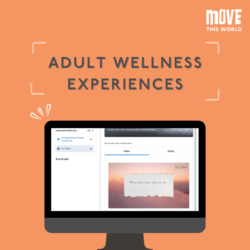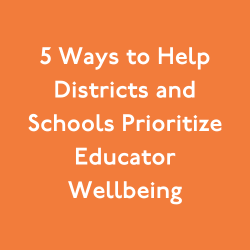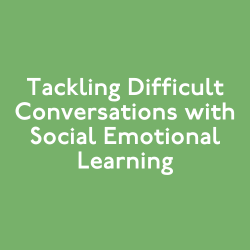Feeling unmotivated is a common challenge. Our motivation is what drives us to meet our goals and losing that sense of determination can leave us feeling confused and frustrated.
With the holiday season among us and winter break quickly approaching, you may be feeling your motivation dwindle. Shopping for presents, decorating, planning, preparing your students for break — there’s so much to look forward to and still so much left to do. Chances are, both you and your students are feeling a little overwhelmed.
There are many reasons for motivation depletion — it can be circumstantial, environmental, emotional, mental, etc. However, rediscovering your spark doesn’t have to be difficult — sometimes we just need to make simple adjustments in order to find it.
Here are six easy tips to help you find your motivation you think you’ve lost it:
Get Moving!
When you’re feeling unmotivated, find ways to start moving! Incorporating movement into your day is not only beneficial to your physical health, but to your mental health and emotional health as well. Studies show that physical activity boosts our memory and thinking skills, and other benefits to physical activity include: better sleep, reduced stress and increased self esteem.
Adding movement to your day does not have to be complicated or time consuming — it can be done right in the classroom. Rock out to your favorite song, take a quick walk around the block — find what works best for you and your schedule and get your students involved, too!
Ideas for incorporating movement into your day include: jumping jacks, stretching, or running in place. Use your students as inspiration by assigning tasks around the classroom, or by doing simple exercises as a group. Get motivated together!
Get a Little Creative
Creativity helps us to find our motivation because it helps to get rid of that pesky “inner critic.” Creative expression is one of the most honest forms of self expression and it allows for us to form a deeper connection with ourselves and the people around us.
Creativity helps us to enter into the “flow state.” The “flow state” is a term used in positive psychology to describe the state in which one becomes completely immersed in a challenge or project. As we meet and overcome challenges while we create, dopamine is released into our brains.
Flex your creativity muscle right now by doodling, scrapbooking, and journaling throughout the day.
Daily Intentions Are Your Friend
An intention can be defined as a purpose, or something that is intended; an aim or a plan. Everything in life that occurs starts with an intention. Intentions are powerful because they help us to remain focused while on the road to achievement, and they provide us with insight and mental clarity as we move throughout our day. Intentions provide meaning, and meaning provides significance; so when you intend to do something, intentions help us to realize the significance of what we’re doing.
Setting a daily intention may be the perfect thing to help you reflect and refocus. Check out these tips for creating your intention journal!
Evaluate Your Surroundings
The next time you’re in a motivational rut, evaluate your surroundings. There could be numerous environmental factors that contribute to a lack of motivation. Our environment has a major influence on our mood, and under certain conditions, can be detrimental to our executive functioning. Our environment affects how we interact with others, our stress, our motivation, etc. If you find that your environment is affecting you negatively, then consider making changes to your surroundings.
Making positive changes to our environment can mean adopting a new work space, or going for a walk; it can also mean hanging up inspirational posters or purchasing a desk diffuser. For more options, check out these tips on bringing the positive energy back to your environment.
Find Moments For Pause
Take a moment to reflect on your life and all your responsibilities, all the calls and texts you receive, and all the media you consume. Have you ever realized that we’re constantly overloaded in our day-to-day? How can we expect ourselves to work through challenges and see the bigger picture if we’re constantly dividing our attention? A key to finding your motivation is to routinely find time for pause.
Go off the grid, mute the notifications on your phone, sit in silence, focus on nothing but your breathing, find time to simply be. It’s important to give yourself the space and time to exist and to reflect. Finding moments for pause can be difficult, but promising yourself just a few moments of pause each day is helpful in the long term.
Focus on Your Students
Sometimes when we’re feeling unmotivated, it helps to focus our attention elsewhere. The holiday season brings opportunities to reflect on the ways we have grown over the past year. Focus your attention on your students and their individual progress. By focusing on how much our students have grown and the role we’ve played in this growth — it becomes a transformative experience that allows your classroom community to recharge and refocus as a whole.
Make this a fun experience by setting up a reward system. Celebrate individual growth by handing out certificates, small rewards, or by having students mark their growth on a growth calendar.
A Final Note
The next time you find yourself feeling unmotivated, do not be discouraged. By making small changes in your approach to life and its many challenges, rediscovering your motivation is no trouble at all.
Sign up for Move This World’s newsletter to stay up to date on social emotional learning.
Enter your email below!










